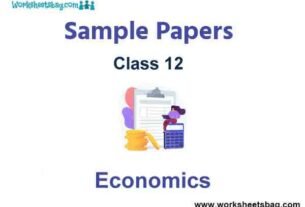Please refer to Class 12 Economics Sample Paper Term 2 Set B with solutions below. The following CBSE Sample Paper for Class 12 Economics has been prepared as per the latest pattern and examination guidelines issued by CBSE. By practicing the Economics Sample Paper for Class 12 students will be able to improve their understanding of the subject and get more marks.
CBSE Class 12 Economics Sample Paper for Term 2
Section A
1. The government can achieve its budget objective of ‘Redistribution of Income’ by ……… .
(Fill up the blank with correct alternative)
(a) managing the general price level in the economy to the desired level
(b) increasing the Gross Domestic Products (GDP) of the economy
(c) bringing the production of goods and services under its direct and absolute control
(d) rationalisation of taxes in pro-poor direction
Answer
D
2. Balance of payments of an economy records ……… for a fiscal year.
(Fill up the blank with correct alternative)
(a) income and expenditure of the government
(b) inflow and outflow of funds of the government
(c) inflow and outflow of foreign exchange to/from the economy
(d) inflow and outflow of loans to/from the rest of the world
Answer
C
3. Identify which of the following bank does not interact directly with the general public?
(a) Bank of India
(b) State Bank of India
(c) Central Bank of India
(d) Reserve Bank of India
Answer
D
4. Identify which of the following is not an example of ‘invisible item’ under current account of the balance of payments transactions?
(Choose the correct alternative)
(a) Air and sea transport
(b) Postal and courier services
(c) Education-related travel
(d) Merchandise linked transactions
Answer
D
5. Read the following statements carefully and choose the correct alternative from the following.
Statement I Demonetisation was the step taken by the government of India in order to tackle the problems of corruption, black money, terrorism and circulation of fake currency in the Indian economy.
Statement II Demonetisation has ensured improved tax compliance in India over the period of time.
Alternatives
(a) Both the statements are true
(b) Both the statements are false
(c) Statement I is true and Statement II is false
(d) Statement II is true and Statement I is false
Answer
A
6. Ms. Sakshi, an economics teacher, was explaining the concept of ‘minimum percentage of the total deposits to be kept by any commercial bank with the central bank of the country, as per norms and statute prevailing in the country’.
From the following, choose the correct alternative which specifies towards the concept explained by her?
(a) Cash Reserve Ratio
(b) Repo Rate
(c) Bank Rate
(d) Statutory Liquidity Ratio
Answer
A
7. Two friends Mira and Sindhu were discussing the exchange rate systems. ‘Under this system, the exchange rates are determined by the market forces of demand and supply.
However, deliberate efforts are made by the competent authority to keep the exchange rates within a specific range’. The above mentioned statement was given by Sindhu, identify the type of exchange rate system was she talking about.
(a) Fixed exchange rate
(b) Floating exchange rate
(c) Managed floating exchange rate
(d) Managed fixed exchange rate
Answer
C
8. Read the following statements carefully and choose the correct alternative from the following.
Statement I Public goods are those goods and services that are collectively consumed by the public.
Statement II Public goods are excludable and rivalrous in nature.
Alternatives
(a) Both the statements are true
(b) Both the statements are false
(c) Statement I is true and Statement II is false
(d) Statement II is true and Statement I is false
Answer
C
9. Under the balance of payments structure of a nation, the two main categories of accounts for the classification of the transactions are ……… and ……… .
(Fill up the blank with correct alternative)
(i) current account
(ii) unilateral transfer account
(iii) capital account
(iv) loan account
Identify the correct alternatives from the following.
(a) (i) and (ii)
(b) (i) and (iii)
(c) (iii) and (iv)
(d) (iv) and (i)
Answer
B
10. Identify which of the following is not a function of the Reserve Bank of India?
(Choose the correct alternative)
(a) To act as the banker to the government of India.
(b) To act as the custodian of the gold reserve of India
(c) To act as the financial advisor to the government of India
(d) To issue coins and one-rupee note
Answer
D
11. Industrial Policy Resolution (IPR) 1956 formed the basis of the ……… Five Year Plan.
(Fill up the blank with correct alternative)
(a) First
(b) Fourth
(c) Second
(d) Third
Answer
C
12. Occupational structure refers to …… .
(Fill in the blank with correct alternative)
(a) size of labour force in a country
(b) number of people living in a country
(c) distribution of workforce among different sectors of an economy
(d) nature of different occupations
Answer
C
13. ……… is the portion of agricultural produce which is sold in the market by the farmers, after meeting their self-consumption requirements.
(Fill in the blank with correct alternative)
(a) Trade surplus
(b) Marketable surplus
(c) Producer surplus
(d) Consumer surplus
Answer
B
14. Read the following statements carefully and choose the correct alternatives given below.
Statement I Poverty line in India is defined in terms of monetary value of the minimum nutritional (calorific) requirements of an individual in a day.
Statement II The definition of poverty line in monetary terms has not changed over the years.
Alternatives
(a) Both the statements are true
(b) Both the statements are false
(c) Statement I is true and Statement II is false
(d) Statement II is true and Statement I is false
Answer
C
15. Read the following statements carefully and choose the correct alternatives given below.
Statement I India is often called as the ‘outsourcing hub’ of the world.
Statement II Availability of skilled manpower is one of the prime factors responsible for the status gained by India at the international platform.
Alternatives
(a) Both the statements are true
(b) Both the statements are false
(c) Statement I is true and Statement II is false
(d) Statement II is true and Statement I is false
Answer
A
16. Before the advent of green revolution in 1960’s, India was primarily dependent on ……… for the supply of food grains.
(Fill in the blank with correct alternative)
(a) United States of America (USA)
(b) Britain (United Kingdom)
(c) Mexico
(d) Union of Soviet Socialist Republics (USSR)
Answer
A
17. From the following given sets of statements in column I and column II, choose the correct pair of statements.

Codes
(a) A-(i)
(b) B-(ii)
(c) C-(iii)
(d) D-(iv)
Answer
D
18. National Bank for Agricultural and Rural Development (NABARD) was set up in 1982 as a/the ……… body to coordinate the activities of all institutions involved in the rural financing system. (Fill in the blank with correct alternative)
(a) cooperative
(b) apex
(c) micro credit
(d) private credit
Answer
B
19. The government of India has decided to vaccinate the adult population of India (with Covaxin/Covishield), without any charge. This would be categorised as ……… .
(Fill in the blank with correct alternative).
(a) revenue nature income
(b) capital nature expenditure
(c) revenue nature expenditure
(d) capital nature income
Answer
C
20. ……… is not a reason for poverty in India.
(Fill in the blank with correct alternative)
(a) Population explosion
(b) Rise in per capita GDP
(c) Low capital formation
(d) Socio-economic exclusion
Answer
B
21. In a hypothetical economy, Mr. Neeraj has deposited ₹ 100 in the bank. If it is assumed that there is no other currency circulation in the economy, then the total money supply in the economy will be ……… .
(Fill up the blank with correct alternative)
(a) zero
(b) ₹ 100
(c) not defined
(d) ₹ 120
Answer
B
22. ‘Since independence, India has witnessed a considerable fall in the infant mortality rate in India’.
Identify which of the following may not be one of the reasons for the fall in the infant mortality rate?
(a) Improvement in health facilities over the years
(b) Improvement in educational standards over the years
(c) Fall in standard of living of the population of the nation over the years
(d) Technological expansion over the years
Answer
C
23. Read the following statements carefully and choose the correct alternatives given below.
Statement I Subsidies do not add any burden on the financial health of a nation.
Statement II Complete removal of subsidies may violate the aim of equitable distribution of income.
Alternatives
(a) Both the statements are true
(b) Both the statements are false
(c) Statement I is true and Statement II is false
(d) Statement II is true and Statement I is false
Answer
D
24. Prior to India’s independence, the stagnation in the agricultural sector was mainly caused by ……… .
(Fill up the blank with correct alternative)
(a) investment in technology
(b) investment in agriculture facilities
(c) advanced infrastructural facilities
(d) land settlement system
Answer
D
Section B
25. Read the following statements Assertion (A) and Reason (R).
Assertion (A) Acquisition of a domestic (Indian) company by a foreign (Australian) company will be recorded on the credit side of balance of payment account.
Reason (R) It leads to outflow of foreign exchange from the domestic economy.
From the given alternatives choose the correct one.
(a) Both Assertion (A) and Reason (R) are true and Reason (R) is the correct explanation of Assertion (A).
(b) Both Assertion (A) and Reason (R) are true, but Reason (R) is not the correct explanation of Assertion (A).
(c) Assertion (A) is true, but Reason (R) is false.
(d) Assertion (A) is false, but Reason (R) is true.
Answer
C
26. Suppose in an economy, the initial deposits of ₹ 400 crores lead to the creation of total deposits worth ₹ 4,000 crores.
Under the given situation the value of reserve requirements would be ……… .
(Fill up the blank with correct alternative)
(a) 0.01
(b) 1
(c) 0.1
(d) 0.4
Answer
C
27. Read the following statements Assertion (A) and Reason (R).
Assertion (A) Major policy initiatives (land reforms and green revolution) helped India to become self-sufficient in food grains production.
Reason(R) The proportion of people depending on agriculture did not decline as expected after the green revolution.
From the given alternatives choose the correct one.
(a) Both Assertion (A) and Reason (R) are true and Reason (R) is the correct explanation of Assertion (A).
(b) Both Assertion (A) and Reason (R) are true but, Reason (R) is not the correct explanation of Assertion (A).
(c) Assertion (A) is true, but Reason (R) is false.
(d) Assertion (A) is false, but Reason (R) is true.
Answer
B
28. Identify the incorrect statement from the following.
(Choose the correct alternative)
(a) Diversification in agriculture sector provides sustainable livelihood rural population.
(b) Diversification includes – change in cropping pattern, shift of workforce from agriculture to other allied activities and non-agriculture sector.
(c) Objective of investment in new agricultural avenues (non-farm activities) increases financial risks for the rural population.
(d) Diversification reduces the proportion of unemployed population in the rural areas to considerable limits.
Answer
C
29. Read the following statements Assertion (A) and Reason (R).
Assertion (A) Human capital treats human beings as a means to an end (increase in productivity).
Reason (R) Human capital formation decreases by way of investments in education and health.
Alternatives
(a) Both Assertion (A) and Reason (R) are true and Reason (R) is the correct explanation of Assertion (A).
(b) Both Assertion (A) and Reason (R) are true, but Reason (R) is not the correct explanation of Assertion (A).
(c) Assertion (A) is true, but Reason (R) is false.
(d) Assertion (A) is false, but Reason (R) is true.
Answer
C
30. From the set of statements given in column I (Name of the Scheme) and column II
(Objective of Poverty Alleviation Programme), choose the correct pair of statements
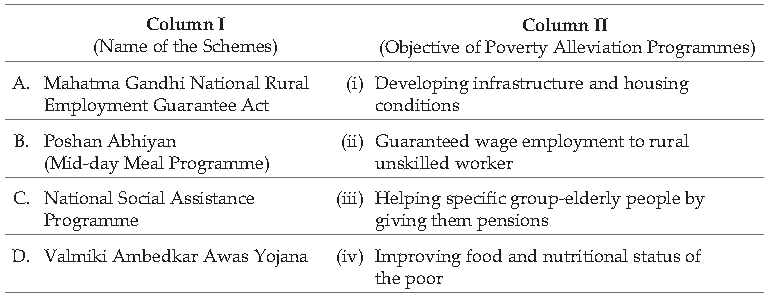
Codes
(a) A-(i)
(b) B-(ii)
(c) C-(iii)
(d) D-(iv)
Answer
C
31.
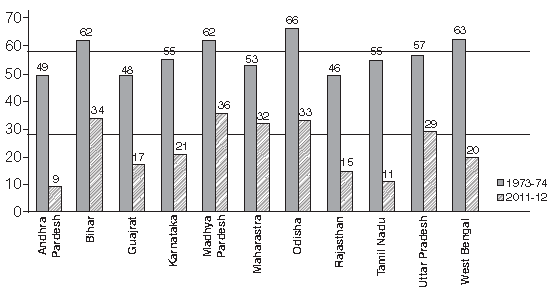
Note For the year 1973, includes the present Uttarakhand : Madhya Pradesh includes chhattisgarh and Bihar includes Jharkhand.
Figure showing population below poverty line in some large states, 1973-2012 (%). On the basis of the given bar diagram, identify the states which are able to reduce the poverty level as compared to other states between 1973-2012.
(a) Tamil Nadu, Gujarat, Bihar, Andhra Pradesh
(b) Bihar, Madhya Pradesh, West Bengal and Odisha
(c) Rajasthan, Madhya Pradesh, Bihar and Uttar Pradesh
(d) Andhra Pradesh, Rajasthan, West Bengal and Tamil Nadu
Answer
D
32. Select Indicators of Development in Education and Health Sectors

Source Economic survey for various years, Ministry of Finance National Statistical Office and Ministry of Statistics and Programme Implementation : Government of India.
On the basis of the above mentioned information answer the following question. The Real Per Capita Income of India (as per the given data) has increased by ……… (approximately) between 1951 and 2016, 2016-17.
(Fill up the blank with correct alternative)
(a) 915%
(b) 1015%
(c) 815%
(d) 715%
Answer
A
33. Read the following statements Assertion (A) and Reason (R).
Assertion (A) The goal of equitable distribution of land was fully served by abolition of intermediaries, in the post-independence India.
Reason (R) Big landlords challenged the land ceiling legislation, delaying the implementation and subsequently escaping from the legislation.
From the given alternatives choose the correct one.
(a) Both Assertion (A) and Reason (R) are true and Reason (R) is the correct explanation of Assertion (A).
(b) Both Assertion (A) and Reason (R) are true, but Reason (R) is not the correct explanation of Assertion (A).
(c) Assertion (A) is true, but Reason (R) is false.
(d) Assertion (A) is false, but Reason (R) is true.
Answer
D
34. Read the following statements carefully and choose the correct alternatives given below.
Statement I The emergence of Self-Help Groups (SHGs) ensured the reduction in the fissures of the formal credit system.
Statement II The borrowings from SHGs mainly confined to consumption purposes by its members.
Alternatives
(a) Both the statements are true
(b) Both the statements are false
(c) Statement I is true and Statement II is false
(d) Statement II is true and Statement I is false
Answer
A
35. Read the following statements carefully and choose the correct alternatives given below.
Statement I The value of money multiplier is determined by the reserve ratio prevailing in the monetary system.
Statement II The process of credit creation directly relates to the value of reserve ratio.
Alternatives
(a) Both the statements are true
(b) Both the statements are false
(c) Statement I is true and Statement II is false
(d) Statement II is true and Statement I is false
Answer
C
36. Arrange the following event in the correct chronological order.
(Choose the correct arrangements)
(i) The year of great divide
(ii) Establishment of Tata Iron and Steel Company (TISCO)
(iii) Introduction of railways in India by the British
(iv) Opening of Suez Canal
Codes
(a) (iv), (ii), (i), (iii)
(b) (i), (iv), (iii), (ii)
(c) (ii), (iii), (iv), (i)
(d) (iii), (iv), (ii), (i)
Answer
D
37. Read the following statements Assertion (A) and Reason (R), choose one of the correct alternatives given below.
Assertion (A) Trade of invisible items between two nations is a part of capital account of balance of payment.
Reason (R) Transactions that affect the asset-liability status of a country in relation to the rest of the world are known as capital account transaction.
(a) Both Assertion (A) and Reason (R) are true and Reason (R) is the correct explanation of Assertion (A).
(b) Both Assertion (A) and Reason (R) are true, but Reason (R) is not the correct explanation of Assertion (A).
(c) Assertion (A) is true, but Reason (R) is false.
(d) Assertion (A) is false, but Reason (R) is true.
Answer
D
38. Demand deposits include ……… and ……… .
(Fill up the blank with correct alternative)
(i) saving account deposits (ii) fixed deposits
(iii) current account deposits (iv) post office savings
Codes
(a) (i) and (ii)
(b) (ii) and (iii)
(c) (i) and (iii)
(d) (i) and (iv)
Answer
C
39. Read the following statements Assertion (A) and Reason (R), choose one of the correct alternatives given below
Assertion (A) Since the default rates of farm loans have become chronically high due to multiple reasons, the rural banks are facing a lot of cash crunch.
Reason (R) Due to lack of proper storage facilities a lot of farm produce is wasted.
Alternatives
(a) Both Assertion (A) and Reason (R) are true and Reason (R) is the correct explanation of Assertion (A).
(b) Both Assertion (A) and Reason (R) are true, but Reason (R) is not the correct explanation of Assertion (A).
(c) Assertion (A) is true, but Reason (R) is false.
(d) Assertion (A) is false, but Reason (R) is true.
Answer
B
40. Read the following statements Assertion (A) and Reason (R), choose one of the correct alternatives given below.
Assertion (A) Since independence, the economic condition of many farmers across India has improved as they have adopted horticulture as a secondary source of income.
Reason (R) Varying climatic and soil conditions have given India an added advantage to be the producer of diverse horticultural crops.
(a) Both Assertion (A) and Reason (R) are true and Reason (R) is the correct explanation of Assertion (A).
(b) Both Assertion (A) and Reason (R) are true, but Reason (R) is not the correct explanation of Assertion (A).
(c) Assertion (A) is true but, Reason (R) is false.
(d) Assertion (A) is false but, Reason (R) is true.
Answer
A
41. Read the following statements Assertion (A) and Reason (R), choose one of the correct alternatives given below.
Assertion (A) Demand deposits are considered as a convenient mode of payment for execution of even the high value transactions.
Reason (R) Demand deposits are non-withdrawable in nature and cannot be withdrawn against issue of cheques and other similar instruments of payment.
(a) Both Assertion (A) and Reason (R) are true and Reason (R) is the correct explanation of Assertion (A).
(b) Both Assertion (A) and Reason (R) are true, but Reason (R) is not the correct explanation of Assertion (A).
(c) Assertion (A) is true, but Reason (R) is false.
(d) Assertion (A) is false, but Reason (R) is true.
Answer
C
42. Choose the correct alternatives to be filled in given blanks A and B.
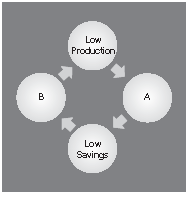
(a) Low level of income and Low level of investment
(b) Low level of investment and Low level of Income
(c) Low mobilisation of savings and Low level of investment
(d) Low level of investment and Low savings
Answer
A
43. Ms Ramanpreet has started a new business venture, she intends to spend a huge amount towards ‘on-the-job training’ of her workers before putting them to work. It exhibits the right step in the direction of human capital formation. Spot which of the following does not directly contributes to the process of human capital formation by Ms Ramanpreet.
(a) Adds skills and expertise
(b) Improves efficiency
(c) Ensures gender equity
(d) Increases output productivity
Answer
C
44. Suppose that the Balance of Trade (BoT) of a nation, exhibits a surplus of ₹ 20,000 crores.
The import of merchandise of the nation is half of the exports of merchandise to the rest of the world.
The value of exports would be ₹ …… . crores. (Fill up the blank with correct alternative)
(a) 30,000
(b) 40,000
(c) 24,000
(d) 35,000
Answer
B
45. Read the following statements carefully and choose the correct alternatives given below.
Statement I Government of India adopted ‘Trickle down approach’ to alleviate poverty to benefit the last man at the bottom of the pyramid.
Statement II Empirical data over the years have shown that trickle down theory did not yield desired results in India.
Alternatives
(a) Both the statements are true
(b) Both the statements are false
(c) Statement I is true and Statement II is false
(d) Statement II is true and Statement I is false
Answer
A
46. Read the following statements Assertion (A) and Reason(R), choose one of the correct alternatives given below.
Assertion (A) If the receipts and payments on the current account are equal to each other, it depicts a situation of current account surplus.
Reason (R) Asurplus current account means that the nation is a lender to other countries and a deficit current account means that the nation is a borrower from other countries.
(a) Both Assertion (A) and Reason (R) are true and Reason (R) is the correct explanation of Assertion (A).
(b) Both Assertion (A) and Reason (R) are true, but Reason (R) is not the correct explanation of Assertion (A).
(c) Assertion (A) is true, but Reason (R) is false.
(d) Assertion (A) is false, but Reason (R) is true.
Answer
D
47. Identify the correct statement from the following. (Choose the correct alternative)
(a) Restrictive policies of commodity production, trade and tariff pursued by the colonial government adversely affected the structure, composition and volume of India’s foreign trade.
(b) Effective trade policies of commodity production, trade and tariff pursued by the colonial government favorably affected the structure, composition and volume of India’s foreign trade.
(c) Liberal policies of commodity production, trade and tariff pursued by the colonial government adversely affected the structure, composition and volume of India’s foreign trade.
(d) Restrictive policies of commodity production, trade and tariff pursued by the colonial government favorably affected the structure, composition and volume of India’s foreign trade.
Answer
A
48. Match the situations given in column I with their respective implications given in column
II. (Choose the correct alternative)

Codes
A B C D A B C D
(a) (ii) (iii) (iv) (i) (b) (iii) (iv) (i) (ii)
(c) (i) (ii) (iii) (iv) (d) (ii) (iv) (i) (iii)
Answer
B
Section C
Direction (Q. No. 49–54) are to be answered on the basis of the following data.

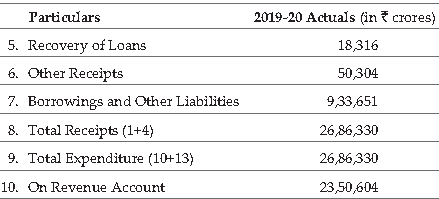
49. The value of recovery of loans has ……… crores between 2019-20 (Actual) and 2020-21 (Budgeted Estimate). (Fill up the blank with correct alternative)
(a) fallen by ₹ 3,349
(b) risen by ₹ 3,349
(c) fallen by ₹ 3,439
(d) risen by ₹ 3,439
Answer
A
50. The percentage change in the non-tax revenue, between 2019-20 (Actual) and 2020-21 (Budgeted Estimate), taking the 2019-20 as base, would be … . (Fill up the blank with correct alternative)
(a) 15.02%
(b) 16.20%
(c) 17.68%
(d) 20.01%
Answer
C
51. Identify which of the following is not an example of tax revenue for the government?
(Choose the correct alternative)
(a) Wealth tax
(b) Special assessments
(c) Income tax
(d) Corporate tax
Answer
B
52. Identify the correct formula to calculate fiscal deficit.
(a) Total Expenditure – Total Receipt ( other than borrowings)
(b) Revenue Expenditure – Revenue Receipt
(c) Capital Expenditure – Capital Receipt
(d) Revenue Expenditure + Capital Expenditure – Revenue Receipt
Answer
A
53. Read the following statements carefully and choose the correct alternatives given below.
Statement I Revenue and capital receipts are increasing but borrowings and other liabilities are reducing.
Statement II Grants and aid for creation of capital assets decreased from 2019 to 2021.
Alternatives
(a) Both the statements are true
(b) Both the statements are false
(c) Statement I is true and Statement II is false
(d) Statement II is true and Statement I is false
Answer
C
54. The value of primary deficit for the year 2020-21, would be ₹ ……… crores.
(Fill up the blank with correct alternative).
(a) 88,134
(b) 3,21,581
(c) 96,133
(d) 6,09,219
Answer
A
Direction Q.No. 55-60 are to be answered on the basis of the following data.
India’s post 1990 economic strategy entailed three important breaks with the past.
• To dismantle the vast network of controls and permits that dominated the economic system.
• To redefine the role of the state as a facilitator of economic transactions and as a neutral regulator rather than the primary provider of goods and services.
• To move away from a regime of import sulbstitution and to integrate fully with the global trading system.
The 1991 reforms unleashed the energies of Indian entrepreneurs and gave untold choice to the consumers and changed the face of the Indian economy. The reform agenda constituted a paradigm shift,
and has defined the broad contours of economic policy making for three decades. Liberalisation was adopted as the guiding principle of governance and all governments since 1991, have broadly stuck to that path. Today we don’t need a paradigm shift. We need to look at individual sectors and see which one of these needs, reforms to create a competitive environment and improve efficiency.
The power sector, the financial system, governance structures and even agricultural marketing need reforms. Today’s reforms also require much more discussion and consensus-building. The central government needs to work in tandem with state governments and consult different stakeholders impacted by reform decisions. Timing and sequencing are critically important in the new reforms’ agenda.
Source Excerpts from ‘Like 1991, the 2021 crisis presents an opportunity, by C.Rangarajan, 22nd January, 2021 (livemint.com)
55. According to the given text, ……… was adopted as the guiding principle of governance and all governments since 1991.
(a) modernisation
(b) liberalisation
(c) privatisation
(d) globalisation
Answer
B
56. Read the following statements carefully and choose the correct alternatives given below.
Statement I 1991 was a landmark moment in India’s post-independence history as that changed the nature of the economy in fundamental ways.
Statement II India’s economic establishment launched a multipronged reforms agenda to repair India’s macroeconomic balance sheet and ignite growth.
Alternatives
(a) Both the statements are true
(b) Both the statements are false
(c) Statement I is true and Statement II is false
(d) Statement II is true and Statement I is false
Answer
A
57. Read the following statements Assertion (A) and Reason (R).
Assertion (A) India’s pre-1990 economic strategy dismantles the vast network of controls and permits that dominated the economic system.
Reason (R) The 1991 reforms unleashed the energies of Indian entrepreneurs, gave untold choice to consumers and changed the face of the Indian economy.
From the given alternatives choose the correct one.
(a) Both Assertion (A) and Reason (R) are true and Reason (R) is the correct explanation of Assertion (A).
(b) Both Assertion (A) and Reason (R) are true , but Reason (R) is not the correct explanation of Assertion (A).
(c) Assertion (A) is true, but Reason (R) is false.
(d) Assertion (A) is false, but Reason (R) is true.
Answer
D
58. In the light of the given text and common knowledge, identify the incorrect statement.
(a) A severe balance of payments problem triggered an acute economic crisis in 1991.
(b) In 1991, the economic and political leadership launched a multipronged reforms agenda to repair the macroeconomic situation of the nation.
(c) In post 1991 situation, the state was given the role of primary regulator of the economy.
(d) Post pandemic, individual sectors should be looked closely. Sectors that need reforms should be identified and corrective action should be taken.
Answer
C
59. Read the following statements carefully and choose the correct alternatives given below.
Statement I Timing and sequencing are critically important in the post-economic reform agenda.
Statement II Post pandemic reforms in India require a paradigm shift.
Alternatives
(a) Both the statements are true
(b) Both the statements are false
(c) Statement I is true and Statement II is false
(d) Statement II is true and Statement I is false
Answer
C
60. Read the following statements Assertion (A) and Reason (R).
Assertion (A) The 1991 reforms released the vitalities of Indian businesspersons.
Reason (R) The reform agenda established a paradigm shift and defined the broad outlines of economic policy making for years to come.
Alternatives
(a) Both Assertion (A) and Reason (R) are true and Reason (R) is the correct explanation of Assertion (A).
(b) Both Assertion (A) and Reason (R) are true, but Reason (R) is not the correct explanation of Assertion (A).
(c) Assertion (A) is true, but Reason (R) is false.
(d) Assertion (A) is false, but Reason (R) is true.
Answer
A

